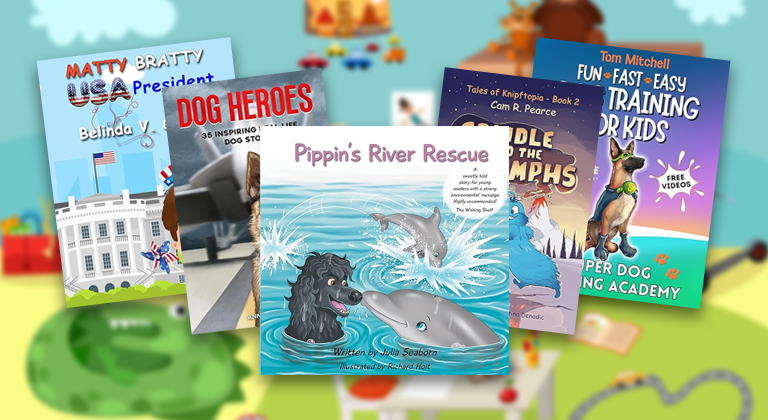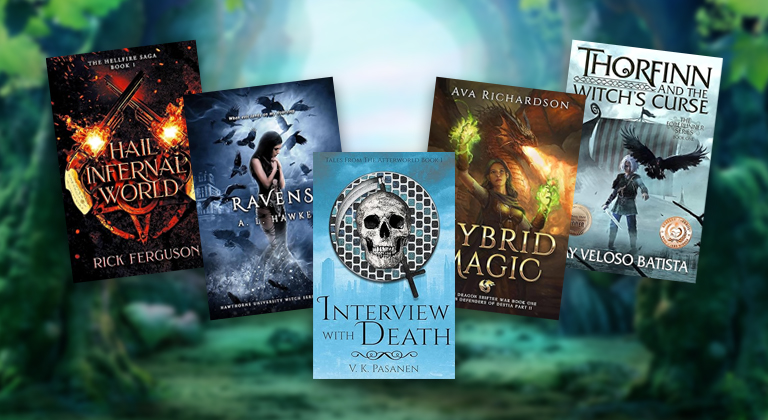The Author’s AI Toolkit – An Ongoing Series
After exploding into public awareness about a year ago, generative AI seems to be all anyone is talking about these days. First it was simply a really cool “chatbot” idea that seemed like a fun distraction and a way to get some quick answers versus having to do a traditional web search. Quickly, though, it became a looming threat hanging over virtually every industry, just waiting to take our jobs.
But for authors, there is more of an opportunity to make our jobs easier than there is a chance we’ll lose them completely. AI can be used as a tool in a variety of ways to do just that, and for this reason, I’m launching a series of articles on this very topic starting with this first of the series.
It’s no secret that I’ve been enthusiastic about Artificial Intelligence (AI) since I first discovered ChatGPT about a year ago. As someone that reads a lot of science fiction, the emergence of this level of AI is something I honestly never thought I’d see in my lifetime. And then one day I woke up and it was literally already here.
Generative AI isn’t new, but the rapid advances in LLMs (large language models) have propelled us forward so swiftly that it feels like this technology emerged out of nowhere. Once OpenAI’s ChatGPT came into the public awareness, it didn’t take long for the world to go AI crazy.
There are very few industries that aren’t going to be completely shaken up by the AI explosion, and almost everyone, from individuals to companies, are trying to figure out how to cash in on the AI boom.
So why shouldn’t you, a self-published author, do the same?
After all, you’re already essentially running an entire company. You manufacture a product (your books), you’re in charge of packaging (covers, blurbs, etc), promotion (newsletters, getting reviews, etc), sales (via bookstores, online or otherwise), advertising, social media, etc. Even if you hire others to do some of these things, you’re still in charge of it all, so why not utilize AI to give you a hand?
Now, to be clear, I’m not suggesting having AI write your book for you, although there are many that are trying to do just that. So many, in fact, that Amazon has been forced to take action. They now require authors to disclose if AI was used to help write their book, and they even imposed a limit of how many books a day can be published on a KDP account.
But just because it’s allowed and people are already doing it, doesn’t make it a good idea. Generative AI is able to make small bits of text sound professionally written, but I have yet to see any examples of long form text (certainly not novel length) that aren’t very obviously written by AI. At most, some companies have started to use AI for blogs and articles, but even then they often have to have a human edit or re-write the finished product to have it sound more realistic (and fact check it!)
And to most authors, that’s a relief. We don’t want to be replaced by AI bots pumping out award winning novels and forcing us to get “real” jobs! But what AI can do is make our jobs easier by helping us with some of that other stuff we need to do to keep our self-publishing company running.
And that’s what I intend this new blog series to focus on.
Getting Started with AI
The best thing about using AI right now is that you can get started with it for free, and even if you wanted to take advantage of some of the more advanced features, the costs are still quite low.
With ChatGPT, you can use version 3.5 for free. For much of what I plan to talk about in this series, you can get away with using that version. While an upgrade to ChatGPT 4 does provide the latest and greatest language model of what OpenAI (the creators of ChatGPT) has to offer, along with some other useful tools, it does come with a $20 monthly fee. I will discuss some of those tools and how they can be useful, but for the most part they aren’t essential. I would certainly recommend sticking with the free version at first and then only upgrade if you find yourself really using it a lot and think the cost is justifiable based on your situation.
There are other alternatives out there as well, such as Claude, developed by Anthropic AI. Depending on the metrics you’re using, Claude is on par or can even exceed ChatGPT in some tasks, however Claude is still in an open beta and has a variety of restrictions. For example, the free version has a daily message limit that varies based on demand. That means that if you are using the free version, you may find yourself unable to continue until your limit increases. Claude is also not available in all countries.
Google’s Gemini (formerly Bard) is yet another option, although most don’t think it quite compares with the other two yet.
Regardless of the AI tool you choose, you have to create an account, even to use their free tiers, but it’s very quick and easy.
For the more technically and/or privacy minded, there are also ways you can install your own versions of generative AI onto your computer. You do need a rather beefy system to run them, however, and for the most part they aren’t going to be as good as the commercial offerings. I’ve played with these myself and I still pay for a ChatGPT subscription. Running AI on your own computer isn’t easy though, and definitely outside the scope of this series. But if you’re interested, you can find plenty of free information and tutorials on how to do it on the web.
Using AI as a Tool
It’s not uncommon for self-published authors to outsource some of their publishing or marketing related tasks, whether due to time constraints or lack of expertise. But some of those tasks can be handled by AI, whether in part or entirely, leaving an author with more money in their pocket and more time to write more books. Even a task that can only be partially completed by AI is still a time saver, leaving you more time to write.
The trick is knowing what it is that AI can help with, and knowing how to ask for it. Which is not quite as easy as it sounds.
The question you ask AI is referred to as a “prompt”, and there is a reason why “prompt engineering” is considered one of the hottest jobs right now. There are even a variety of places now that offer courses and certifications on the subject!
The answers you get from AI can vary greatly based on your prompt, which is why it is so important to get right. But don’t worry, I’ll definitely be talking about prompting a lot more in future articles as it will be used for whatever topic we’re discussing.
With that in mind, I want to briefly go over a few of the areas that I think AI can help. In the coming weeks, I plan to add to this blog series by expanding on each of these items with an article of their own. And there will be plenty of other topics to cover beyond this list as well, as things move very quickly with AI. But I’m also open to covering topics suggested by you, so feel free to leave a comment below about anything you want me to cover or even just send me an email.
So let’s go over some of the areas that I plan to cover, where I think AI can really benefit authors.
Brainstorming
To me, this is where AI shines. Blank page syndrome and writer’s block can be a big problem for many authors, and sometimes all it takes is a bit of a push to get over it.
AI can provide that push in a variety of ways, from generating ideas for a new novel, to helping plot out your existing idea, to even coming up with ways to drive your in-progress story forward. It’s all about the prompt you use!
Character Development
Most stories are packed with interesting and unique characters, but it’s not always easy to come up with such a big cast, including their backstories, personality traits, motivations, etc. This is another way that AI can help, providing you with a limitless pool of ideas to pull from.
And if you’re concerned that the ideas aren’t unique, you can pick the ones you like and continue to drill down into them, having the AI generate and regenerate ideas based on your prompts that can further refine each one to really make it your own and fit within your world.
Blurb Writing
Many great novelists have a hard time writing blurbs, for a couple of reasons. For one, blurbs are more about marketing than creative writing. Your goal is to create a blurb that captures the essence of your story in just a couple short paragraphs, without giving the whole thing away. Yet that’s also what leads to the other problem. Being so close to the story, it’s often hard for authors to determine what those key points are. Many have a tendency to include too many details, which is why it is not uncommon to have someone else write your blurb for you.
However, for those who choose to tackle the task themselves, AI can help. Not only can it condense a book down to the key elements, it can even write it in the specific style of your genre. I wouldn’t recommend using the blurb an AI generates verbatim, but it can be an excellent starting point – especially for those stuck staring at a blank page with no idea where to begin.
Proofreading
I definitely wouldn’t recommend replacing your current editor with AI, but for simple proofreading, AI can really help. If you use it to catch the more obvious issues, then your human editor can spend less time fixing those and more time with the more complicated tasks. And if they are spending less time on your book as a whole, you may end up with a smaller final bill!
You can also use AI to ensure consistency, something that becomes increasingly difficult and tedious in longer works.
Beta Reading
As with editing, I wouldn’t use AI as a replacement for beta readers, but it can provide some helpful feedback. The key is being specific when asking for what you want feedback on, but you can also create “reader profiles”. That is, through specific prompting, you can have the AI take on the persona of a specific type of reader (age, sex, race, demographic, etc) and then provide feedback based on how that type of reader would like your book.
Social Media/Advertising
Many authors find it difficult to come up with social media posts or even the copy needed for creating small ads on places like Facebook. This is an area where AI shines. Not only can it generate short and catchy social posts, but it can generate hashtags and emojis to include. And you can direct it to create all the elements needed for advertising on specific platforms, such as creating the headline, copy and description fields for a Facebook ad.
Questions & Rules Around Using AI
There are still some that question the use of AI, specifically around the ethics of using models that have been trained on data that, while public, wasn’t expressly allowed by the original creators. Because of those questions, there are various lawsuits making their way through the US court system, and those lawsuits could have an impact on how things play out in the future.
Yet it may take years before these lawsuits are resolved, and given how much money is at stake and how big the companies are that are defending the use of AI, I would honestly be shocked if there was any sort of outright ban on using the technology. More likely, I think some agreement will be made where companies have to pay royalties to those whose content they used in training, or perhaps they’ll generate models that are completely opt-in, etc.
In the short term, Amazon does have questions on KDP asking about whether AI was used to generate any of the text or images in your book. For images, I think the answer is pretty obvious (either you used AI to generate images for your cover or interior or you didn’t), but with text it’s more up for interpretation.
Right now, Amazon states that they are simply collecting information on the use of AI in content creation, and they define that as “text, images, or translations created by an Artificial Intelligence-based tool”. To me, that means that as long as you aren’t using AI tools to generate your actual writing, you’re fine to click “no” here. The areas I plan to focus this series on, as per the list above, are in using AI as a tool to help speed up the writing and publishing process and make it easier, not supplant it completely with AI generated content.
But if it is currently legal to use AI to generate content, which includes cover images and even your book itself, why is Amazon asking about it?
Well, as can be expected, Amazon doesn’t say why they want that information. Best guess is that they are hedging their bets. If some decision does eventually come down restricting or even banning the use of AI for creating content like books or covers, Amazon probably wants a very easy way to quickly identify all of the titles that are breaking those rules so that they can pull them immediately.
Does that mean you shouldn’t waste time with any of this? No, of course not. Even for those that are using AI to generate content, it could be years before any decision is made and even then, it may not affect them at all. In the meantime, they can be earning money on whatever they create. And for those just using it as a tool, there is little to no risk at all.
AI is not going away completely, no matter what. Authors are starting to embrace the technology, in whatever form they are comfortable with. In my opinion, the risk of being left behind outweighs the uncertainty of what may happen in the future.
Conclusion
AI is such a new and rapidly changing technology that I don’t know how many people can really claim to be an expert on it, so I definitely don’t count myself as one. However, it is an area of intense interest to me, and one that I follow closely and experiment with regularly, which means I probably know more about it than the average author. Through this series, I hope to help impart some of that knowledge and help everyone use these new tools to improve their processes and make their writing and publishing a bit easier.
It’s certainly not for everyone, but until you give it a try, how will you know whether or not it can help? There’s no harm in looking into AI, if for no other reason than to satisfy yourself that you aren’t missing out on anything.
My plan for this series is to try and cover a new subject once or twice a month, at least until I cover all of the most important topics. After that it may be more occasional.
I also plan to run some webinars for those that want more hands on, visual training. More info on that to come.
And of course, for anyone that wants to discuss this one-on-one, specifically as it pertains to their books and situation, you can always book a consult call with me.
Whatever your needs, I’m excited to help start you on this journey, and I look forward to your thoughts and questions in the comment section below (or simply emailed to me directly.)












I would love to know when you’re holding a webinar.
These are handy tips. Thanks for sharing what you know about the tools!
I’m a seventy-year-old Flemish writer. I’ve been a full-time multiple award-winning author for 30 years and published (traditionally) 45 cross-over novels between literature and the suspense genre. In Flanders, the author community stumbles behind when it comes to using AI as a tool for writing better novels. I sense that my creative powers are diminishing and I’m seeking a way to write a last novel. Your blog was instructive for me and I’m looking forward to reading new posts. Thank you.
One of the platforms gives you a chance to rewrite your blurb with AI. So, always willing to improve I tried this a couple times. I write crime and the first blurb I tried was about a homeless man living in London. No matter how many times and what ways I put it in, AI always returned me to a detective living in a small American town. I don’t even write for a US audience. In the end I gave up on that one.
Instead I tried my mystery about a Chameleon Killer. Yup, it insisted that the work was set in small town America. I can see AIs confusion here in that there was once a notorious killer in the USA nicknamed The Chameleon Killer but even so… this is a completely different story. Eventually, I used my own blurb.
Depends on the platform and prompt you used, not sure why it would do that. I’ve tried having it re-write blurbs and come up with blurbs based on an uploaded book, and never seen that particular issue. Was this with ChatGPT or something else?